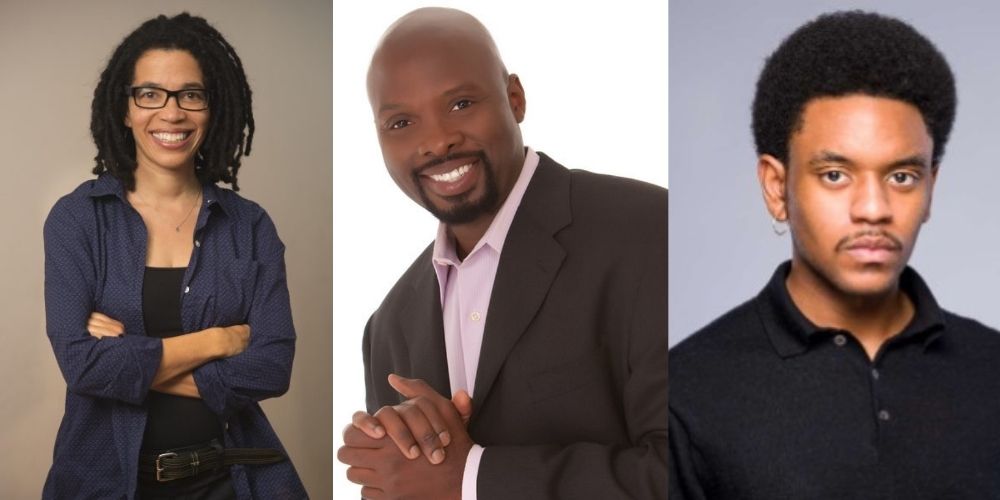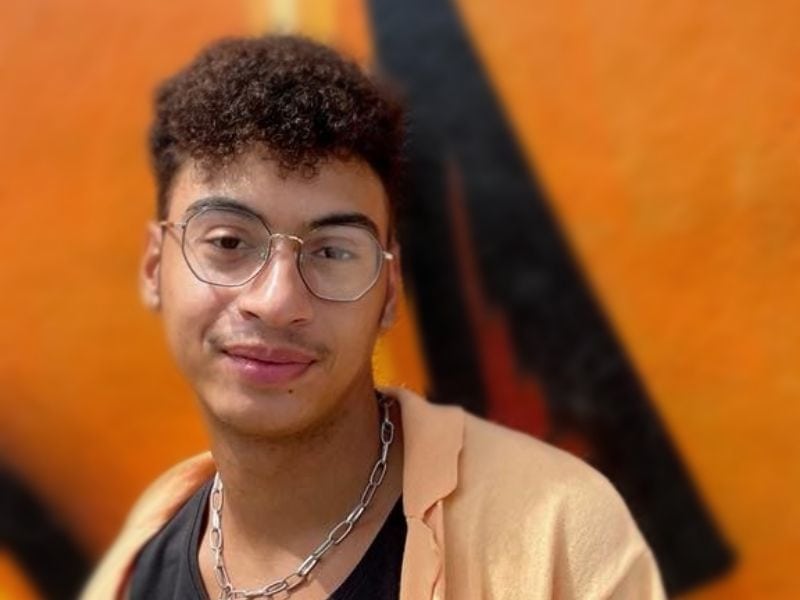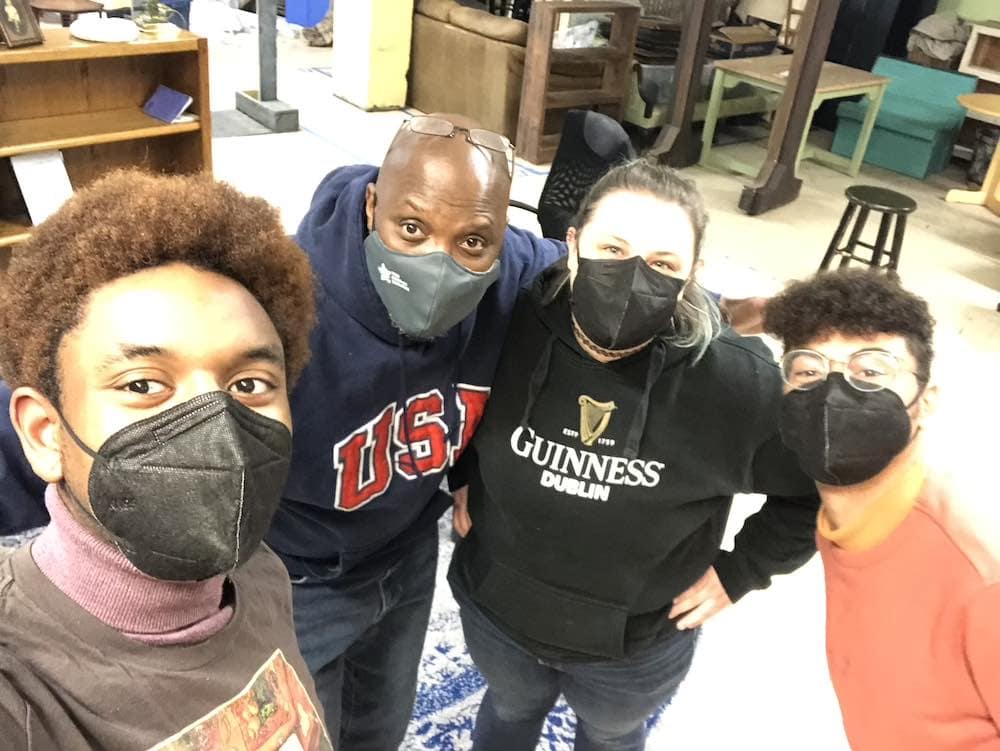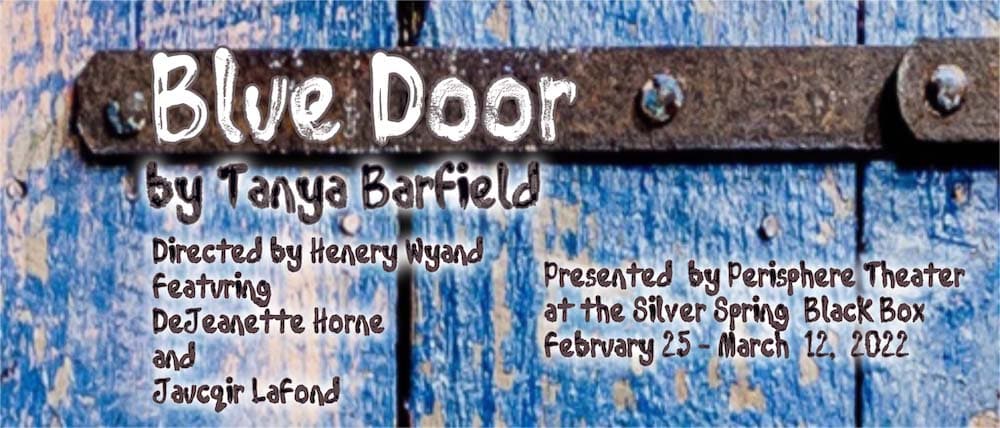Henery Wyand is a young director on a mission “to center underrepresented voices, specifically Black voices,” and he’ll be doing exactly that with Perisphere Theater’s production of Blue Door, now in rehearsal for an opening February 25 at the Silver Spring Black Box Theatre.
Blue Door is a play with original songs by Tanya Barfield, co-director of the Lila Acheson Wallace American Playwrights Program at the Juilliard School and a writer for HBO, FX, and Showtime. Blue Door examines the effect of the past on the present by following one Black family through slavery, Jim Crow, lynching, and other forms of American racism from 1851 to 1995. During the play, the cumulative effects of racism haunt the family’s last surviving member, Lewis, in one insomnia-plagued night.

When Blue Door premiered off-Broadway at Playwrights Horizons in October 2006, the New York Times wrote, “Tanya Barfield’s thoughtful play deals with themes central to the work of August Wilson. Mr. Wilson examined the African-American experience through a wide-angle lens. Ms. Barfield concentrates on the same battle but locates it in a single man’s soul.” Variety said, “The writing never asks for pity. Instead, demons are faced with humor and incisive metaphors.”
Henery Wyand is a recent Shakespeare Theatre Company directing fellow and has previously directed at the Adirondack Theatre Festival. In 2021 he assisted the director of the off-Broadway production of Mrs. Warren’s Profession. Wyand holds a BA in Drama from Vassar College and studied advanced directing at the Eugene O’Neill Theater Center’s National Theater Institute.
I wanted to know more.
DCMTA: What was your experience as a directing fellow with Shakespeare Theatre Company?
Henery Wyand: It was a great introduction to the vibrant theater community in the DMV — six months of workshops, meetings with theater artists from across the country and DC, and creative thinking. The fellowship provided me with the necessary resources to be a confident and bold artist, even in these uncertain times.

Why did you want to direct Blue Door? What moved you, what connected you, what excited you?
I wanted to direct Blue Door to be able to tell a Black story written by a Black artist.
This play was written in 2006 before the Black Lives Matter movement and references past civil rights movements and actions such as the Million Man March. I was curious what it would mean to tell this story in the present moment, in the Black Lives Matter era.
Like many other Black people in the United States, my generational history has been erased and I don’t really know where “home” is. This play celebrates the individual history of Lewis (played by DeJeanette Horne) and the importance of sharing your own story with others. On a personal level, Blue Door has allowed me to realize what I don’t know about my own family history; it has inspired me to learn about my lineage, through my ancestors and the people who made it possible for me to be.
You say on your homepage:
yes your theatre is racist. all theatre is political. all theatre is queer. all theatre is experimental. theatre is racist. theatre is classist. theatre is transmisogynistic. get over it.
How does that statement relate to your own life as a theater artist? How do you hope to create change and make a difference?
I first wrote those words as part of a manifesto during a Directing Training Program when I was in college. I was frustrated because I was at a predominantly white institution where I could not work on the art I wanted to create. My sophomore year of college I was one of nine Black male-identifying students in the entire school. This lack of representation made it difficult to focus on work that centered my experience. This manifesto was my visceral response to how these educational institutions do not serve artists of color. I had to overcome so many barriers just to be able to tell the stories that spoke to me. Because the systems of white supremacy are integral to the structure of the institution of theater, my existence and my art are inherently political. Theater is art, and art cannot exist in its true natural state in a society of commercialization and capitalism. Art does not thrive when under the pressure of consumption; it thrives when it can be genuine and not manipulated into a money-maker. I strive with my art to center underrepresented voices, dismantle power structures, and create accessible spaces for people to share community.
If you had an elevator ride to pitch Blue Door to a possible audience member, what would you say?
Through the use of song and the sharing of stories, Blue Door is the story of a middle-aged Black man named Lewis reckoning with how his ancestors’ experiences and trauma affected his own life as a Black man in 1995. The story contends with the reality that even though he has reached his idea of success (influenced by white supremacy and capitalism), he still experiences the trauma of racism.
In addition to directing Blue Door, you’re also designing set and sound. What can you share about that?
It has been a fun and challenging experience having multiple roles for Blue Door: directing, set design, sound, and costumes. When thinking about and designing the set, I wanted to explore what it would look like for the past and present to exist at the same time. Lewis’s world is a circle because of how the cycles of racism and anti-Blackness have affected him. His world is enclosed by the past and he cannot escape the generational trauma that has been passed down — all of this is captured in both sound and the set.

How do you hope audiences will respond to Blue Door?
I want the audience to understand that the structures created to disenfranchise Black people are very much still in place. They are not only of the distant past but very much a reality of the present. Slavery and segregation may have legally ended, yet the ideologies and attitudes that created them still exist in society today. Many low-income Black youth are thrown into underfunded schools without resources, without people who believe in them, and are stuck in the school-to-prison pipeline. So many Black people are unjustly imprisoned and are ripped of their rights, used for their labor instead of receiving resources. Black trans women’s life expectancy is about 35 years because of the violence they face. Black people are being killed by the police, the people meant to protect us. The electoral system is set up to devalue the Black voice and to discourage Black voters from using their voice. These are all systems that have been passed down, changed, and wrapped in a bow from slavery. I want this play to exhibit the power of storytelling — that storytelling is power and stories are crucial to the survival of humanity. This play is a call-to-action to all of us to use our power to uplift and celebrate the stories of those we often do not hear from.
Blue Door will play for 10 performances from February 25 to March 12, 2022, presented by Perisphere Theater performing at the Silver Spring Black Box Theatre, 8641 Colesville Rd, Silver Spring, MD. Tickets ($34 regular price, $28 senior, $24 student) are available online.
COVID Safety: Proof of vaccination against COVID-19, including a booster, is required to attend the play. Requests for exemptions must be made at least 48 hours before a performance. Patrons are required to wear masks that provide a full seal over both mouth and nose at all times unless drinking water. For more information about COVID protocols see perispheretheater.com/covid-19-precautions/





